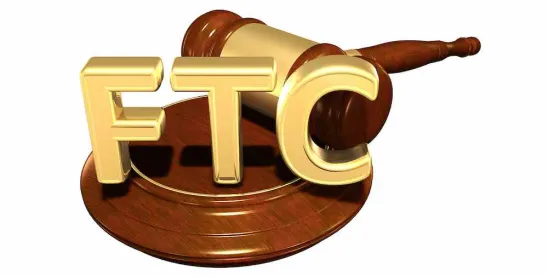On July 23, 2024, the United States District Court for the Eastern District of Pennsylvania issued an order in ATS Tree Services, LLC v. FTC, Case No. 2:24-cv-01743-KBH, denying Plaintiff ATS Tree Services, LLC’s (“ATS”) motion for preliminary injunction to enjoin the FTC’s Noncompete Ban which, if not enjoined by other courts, will go into effect on September 4, 2024.
Unlike in Ryan LLC v. FTC, Case No. 3:24-cv-00986-E pending in the United States District Court for the Northern District of Texas, which was discussed in our earlier post, where the plaintiffs include the U.S. Chamber of Commerce, which represents companies employing hundreds of thousands, if not millions, of employees, and Ryan LLC, an employer with thousands of employees nationwide, ATS is a tree-care company that requires each of its 12 employees to enter noncompete agreements restricting their ability to work for ATS’s competitors within a specific geographic area for a year after they leave ATS’s employ.[1] ATS filed a motion for preliminary injunction to enjoin the FTC’s rule banning nearly all noncompetes (the “FTC’s Noncompete Ban”), which would invalidate ATS’s noncompetes on September 4, 2024 if not enjoined.
In direct contrast to the ruling by the Ryan court, the ATS court denied ATS’s motion, ruling that ATS is not likely to succeed on the merits and that it failed to establish the requisite immediate harm to justify preliminary injunctive relief. Having failed on those two items, the ATS court did not get to the questions of balancing equities or the public interest.
Unlike the Ryan court, the ATS court took a more comprehensive view of the authority granted to the FTC under Section 6(g) of the FTC Act, ruling that such authority is in addition to authority under Section 5, and that, as such, the FTC’s Noncompete Ban falls squarely into the “rules and regulations” the FTC is authorized to issue to prevent unfair methods of competition. In so ruling, the ATS court specifically rejected the plaintiff’s theory differentiating between substantive and procedural rulemaking (which the Ryan court accepted). The ATS court reasoned that Section 5’s directive to the FTC to “prevent persons, partnerships, or corporations . . . from using unfair methods of competition in or affecting commerce and unfair or deceptive acts or practices in or affecting commerce” “inherently contemplates” substantive rulemaking, thus implying that the FTC has authority to issue substantive rulemaking. Given that the ATS court found clear Congressional authority under Section 6(g) for the FTC’s Noncompete Ban, the ATS court ruled that the major questions doctrine did not apply.
The ATS court rejected the plaintiff’s theory that the FTC’s Noncompete Ban is overly broad and against the rule of reason, citing to Supreme Court case law that “Congress sought to provide broad and flexible authority to the Commission as an administrative body.” This aspect of the court’s ruling directly contradicts the Ryan court’s ruling that the FTC’s Noncompete Ban is overly broad (which was briefed in connection with the plaintiffs’ and amici’s arguments that the FTC’s Noncompete Ban is arbitrary and capricious).
In addition to the dizzying differences between the rulings in Ryan and ATS, the ATS court somewhat puzzlingly addressed Plaintiff’s point that states, not the federal government, have traditionally regulated noncompetes (an incontrovertible fact) by highlighting that the FTC’s Noncompete Ban provides that “[s]tates may continue to enforce in parallel laws that restrict noncompetes and do not conflict with the final rule” and thus, “state laws are not entirely preempted” despite the fact that, by virtue of the sweeping ban imposed by the FTC’s Noncompete Ban, only state laws that more comprehensively ban noncompetes (e.g., in California) would not be preempted by the FTC’s Noncompete Ban.
In addition to finding against ATS on the likelihood of success on the merits, the ATS court found that ATS failed to establish a risk of irreparable harm. The court specifically noted that ATS’s evidence of irreparable harm was “sparce” and the affidavit in support “contains no affirmative statement that any employee is even likely to leave ATS” such that the “extraordinary remedy” of a preliminary injunction is not appropriate. The court also rejected ATS’s claim that its irreparable harm stems from a risk of loss of contractual rights, noting that ATS relied on a series of out-of-circuit cases.
What’s Next?
The ATS court’s decision is diametrically opposed to the decision from the Northern District of Texas in the Ryan case. In addition to the ATS and Ryan cases, the same issues are before Chief Judge Corrigan in Properties of the Villages, Inc. v. FTC, in the United States District Court for the Middle District of Florida, Case No. 5:24-cv-316. Briefing in that case is still ongoing, with the FTC’s response to the plaintiff’s motion for preliminary injunction due on July 25, 2024.
Although some may view the polar opposite decisions out of Texas (where the judge was appointed by President Trump) and Pennsylvania (a Biden appointee) as political, it is not that simple. As we pointed out in comments to the FTC that we prepared on behalf of the Illinois Chamber of Commerce and the Greater Boston Chambers of Commerce, some of the “reddest” states (North Dakota and Oklahoma) legislatively ban noncompetes (as do liberal California and Minnesota), while some of the “bluest” states (e.g., Illinois, Massachusetts, Oregon, Washington) have rejected noncompete bans in favor of compromise legislation that require advance notice and include compensation thresholds. The current ongoing realignment of the political parties only further demonstrates this dichotomy, with J.D. Vance, Republican candidate for Vice President, indicating his support for FTC Chair Lina Khan and her policies, and others suggesting that Kamala Harris, Democrat candidate for President, might remove Chair Khan if elected. Neither candidate has yet to issue a statement suggesting their respective positions with regard to the FTC’s Noncompete Ban or whether their administrations would pursue an alternative path.
The already dueling decisions appear to be teeing up a possible multi-circuit split which will likely head to the Supreme Court for disposition if the November 2024 elections do not result in the FTC walking back its Noncompete Ban.
In the meantime, the competing decisions leave employers with even less certainty about the future state of noncompete laws. One thing to note, however, is that, unlike the Ryan case, which implicated the possibility of a national injunction or an injunction as to the U.S. Chamber of Commerce’s members via associational standing, the ATS case did not address associational standing or comment on the possible scope of injunctive relief. The Ryan court is preparing a decision on the merits before August 30, 2024, which may have national scope.
While we still believe that the Texas court will vacate the FTC’s Noncompete Ban and/or issue a sweeping injunction that bars the FTC’s Noncompete Ban from going into effect, the ATS ruling elevates the risk that the Ryan court maintains its more limited injunction and that nationwide relief is not in the cards. With that in mind, employers can start to “brace for impact” from the FTC’s Noncompete Ban (which would go into effect on September 4, 2024 if not vacated or enjoined) by:
- Identifying senior executives[2] for whom the ban will not apply under the FTC’s Noncompete Ban.
- If not already a member of the U.S. Chamber of Commerce or one of the other intervenor organizations in the Ryan case, consider joining the organization to benefit from any rulings that will apply to their members by virtue of associational standing, given that the Ryan court intends to consider associational standing of the U.S. Chamber of Commerce’s and the other intervenor organizations’ members in its merits disposition.
- Consider making appropriate preparations if the FTC’s Noncompete Ban is not enjoined with respect to new hires and workers whose noncompete agreements will be invalidated.
- Evaluate adopting and bolstering alternatives to noncompetes such as “garden leave” provisions, enhanced confidentiality provisions, non-solicitation provisions, trade secret audits, and trade secret training programs.
- Consider beginning to prepare notices that will need to be issued to employees with noncompetes that are no longer enforceable and mailing lists for accomplishing that. If the FTC’s Noncompete Ban goes in to effect, such notices will be due by September 4, 2024. That being said, employers should note that there is no private cause of action under the FTC’s Noncompete Ban (although some have suggested that an argument could be made for one under states’ “Mini-FTC Acts”), and the FTC can only obtain a cease and desist order from an administrative law judge should an employer fail to comply with the notice provisions (unless and until any employer violates such an order, in which case the FTC could seek penalties), so the risk of waiting until the Texas court’s August 30 ruling to begin that process, if necessary, is relatively minimal.
ENDNOTES
[1] The court noted that while ATS claims to have narrowed the scope of its noncompete provisions over time, ATS did not file or otherwise provide a copy of its employment agreement or the noncompete language to the court and that failure informed the court’s decision. This was a surprising tactical decision that may have had a material impact on the Court’s ruling, as might have the fact that the ATS employees are not all high level employees with access to critical trade secrets.
[2] A “senior executive” is someone who earns more than $151,164 per year and is in a “policy-making position,” i.e., they have final authority to make policy decisions regarding significant aspects of a business entity or common enterprise.






 />i
/>i

